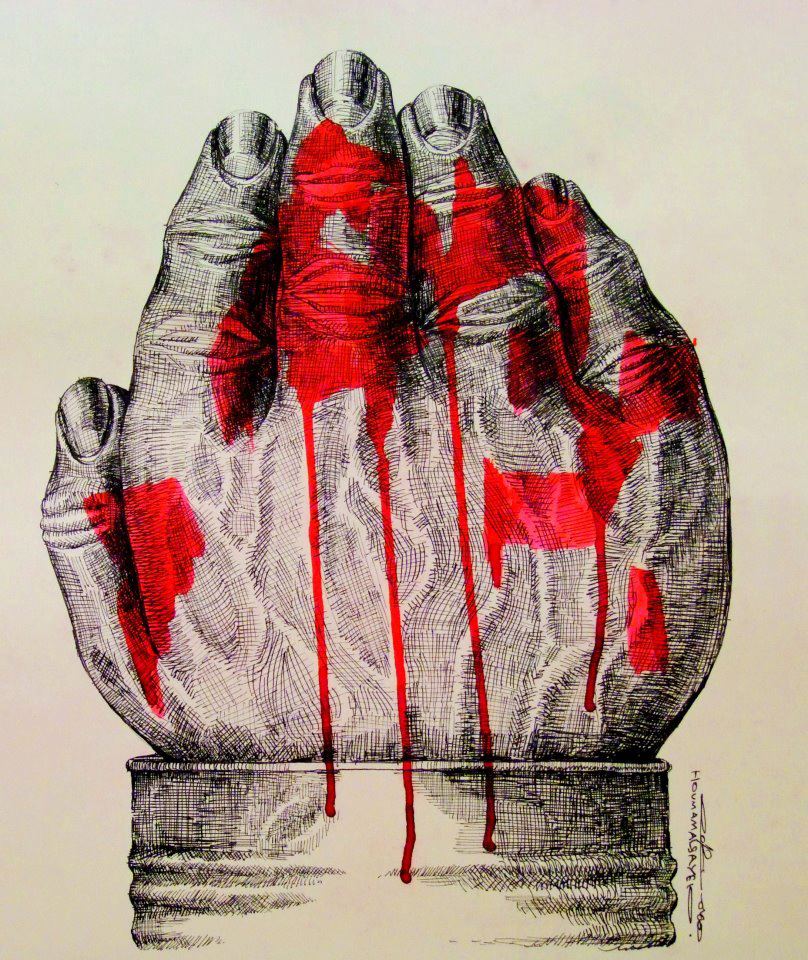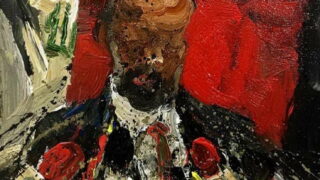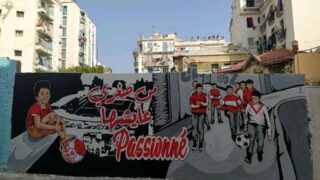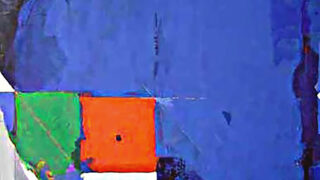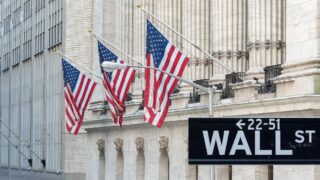
This publication has benefited from the support of the Rosa Luxemburg Foundation. This text may be reproduced in part or in full, provided the source is acknowledged.
The Algerian economy, dominated by the oil rent (98% of exports earning), is heavily dependent on foreign countries (70% of the country's needs are imported). Faced with the inexorable evaporation of foreign exchange reserves and the mechanical contraction of its tax revenues due to the drop in oil prices, the regime panics. The executive authority, without legal basis or legitimacy, undertakes stopgap measures to delay inevitable deadlines. This authority’s agenda excludes both the revival of investments and the resorption of the very substantial informal sector (nearly half of the GDP!).
The celebration of the Prophet’s birthday, “Mouled Ennabaoui El Sharif”, is an annual celebration in Algeria. It is different from other religious events for its festive and particularly noisy nature. The traditional candles on the windowpanes and balconies are echoed, until late at night, by uninterrupted sounds of explosions and crackling bursts . Nothing alarming however as those are only fireworks. In a joyless country, young people celebrate the "Mouled" by blowing up tons of crackers, despite the likely risks of losing a one or two fingers or causing fires!
In just a few hours, literally tons of firecrackers go up in smoke which could seem banal to a distant observer except that, in Algeria, their import is strictly prohibited. So, where do these astronomical quantities of firecrackers come from? (1) Everyone knows that dozens of containers, full of pyrotechnic devices, coming mostly from Hong Kong, unload in the main Algerian ports a few days before the festival of the Mouled. If this seems like a funny anecdote, the actual amounts of money involved in these transactions are quite serious.
No one is unaware that these containers represent tens of millions of dollars. It is also common knowledge that illegal importers of these illicit products are networks involving customs employees, policemen and high-ranking military personnel. These goods are sold in the open, without invoices, payed in cash, undeclared, and, therefore, they evade taxes. The years go by and during each Mouled’s celebration the same scenario that allows for a quick and disproportionate enrichment is inevitably reproduced. This is an informal transaction model made possible by the weakening of the state and the incompetence of administrations wrought with corruption.
The Colossal Weight of the Informal
However, it must be emphasized that this parallel economy cannot be reduced to the underground economy or the deliberately covert, directly fraudulent activities. For example, many housewives traditionally engage in undeclared subcontracting activities (embroidery, weaving, confectionery, etc.) in order to generate complementary income. It is therefore necessary to classify the different categories that constitute this sector and, accordingly, rank its components by importance.
For years, numerous studies on this topic have been produced but, in the absence of reliable statistical instruments and verified data (2), no accurate assessment of the exact level of informal activities, the sectors concerned and what they exactly represent were ever published.
According to the sources, the size of the informal sector ranges from 40% to 50% of the gross domestic product (GDP) and represents more than 100 billion dollars (up to 130 billion according to certain estimates) (3). This exponential function is confirmed by the economist Mohamed Achir (4), a well-known expert, who finds that this sector accounts for about 45% of the GDP (5). This sector of monumental proportions is constituted of a wide range of undeclared activities that evade taxes, regulation, law and professional standards.
According to the National Statistics Office (NSO), the informal economy employed nearly 4 million people (6) in 2012, which represents 46% of the total non-agricultural labor force. These precarious workers, without rights or social protection, suffer particularly adverse working conditions. According to experts in this field, informal institutions are often poorly managed and display low productivity.
For the most part, this sphere, lying outside the scope of national regulation and accounting, concerns commercial activities and services, construction and public works (where the labor force is largely composed of exploited workers from the sub-Saharan countries), and, to a much lesser extent, production activities.
Banks are Out of the Equation
A significant and particularly sensitive segment of the informal sector is the parallel exchange market. Transactions are very difficult to appraise, but bankers believe the informal currency market in Algeria could reach 10 billion dollars annually. This market is not just for tourists who want to go shopping in Europe. It primarily interests companies and, in particular, the hydrocarbon sector which has long benefited from the significant difference between the official rate of exchange and the one used in the black market (7), allowing them to buy at low prices (from real covert trans-Mediterranean banks) the dinars they need for their daily activities in Algeria.
If they escape the tax department, informal transactions in the country do not go through the banking system which is often pointed out for its inefficiency as it is totally dependent on the realities of the environment in which it operates. Payments are made in cash, and notes are packed into ugly pollutant black plastic bags. It is worth noting that these bags, which have been banned by the Ministry of the Environment for years, are produced in illegal sweatshops in the country. Financial transactions that occur outside the banking systems naturally leave no trace or record of any kind. Attempts to force the use of checks when dealing with transactions of over one million dinars have failed. The traceability of capitals and goods from the informal market is therefore impossible. Cash settlements help, with the absence of any billing or receipts, to blur the leads and anonymize the different parties involved in these transactions.
Public Impotence: Revealing the Absence of a State
Denounced in a purely futile way for decades, the informal sector’s expansion seems irrepressible and unstoppable. Administrative measures are regularly announced, first to supervise then to contain this sector but they appear to be mere castles in the air. In fact, contrary to what they claim to achieve, these measures only increase the state’s discredit by highlighting its impotence and the utter futility of the procedures - announced with great fanfare in the media- in controlling the commercial transactions. For example, the law of the "voluntary fiscal compliance" promulgated in 2015, which in fact acts as a tax amnesty, was met with little enthusiasm: neither the banks nor the state’s treasury had recorded significant revenues from amassed capital. The sporadic raids on the markets which try to put the kibosh on undeclared activities end up only punishing the small fry of hawkers, who are the weakest link in the network, without even slightly discomforting the main beneficiaries of the informal economy.
In reality, the size and nature of the informal sector show that it is no longer a technical problem that could possibly be resolved by a clear economic policy intelligible and accepted by all, by means of the law or by the mobilization of an effective administration. What is revealed by this sector is the absence of a state. The impotence of the authorities is a clear confession to a general institutional dysfunction. Should we then consider that the informal sector is more powerful than the state?
This argument is made with much conviction by some experts who rightly point out the gap between what is said in official statements and the tenacious realities of the field. In fact, the informal sphere and its “mores” contaminating the entire economy, could be considerably reduced if the concerned administrations were allowed to play their full role. The technical measures needed to resorb this sector, rehabilitate its workers and reintegrate its activities into official channels are known. Liberating the transactions and their physical supervision are proven ways to support the expansion of legal and declared activities.
"Unconventional" and Informal Financing
The real power lies outside the institutions that put a patch over the situation to gain time, even when this means sacrificing the essential. For instance, the independence of the Bank of Algeria, an acquis of the law on ‘Currency and Credit’ of 1990, was erased with a stroke of a pen at the end of 2017, by obliging the central bank to buy treasury bills amounting almost 20 billion dollars over a period of five years (a process known as "money printing" usually used in the case of a budget deficit). However, this chosen solution is nothing but an escape forward; an effort made by the executive authority to compensate the decline in tax revenues caused by the deterioration of the oil prices since 2014.
With this "unconventional" financing, the government takes the risk of considerably increasing inflation, which is something that experts of all kinds strongly denounce. It is a risk taken in the context of a rent economy, where three quarters of the consumption of households and businesses are imported, and where the quasi-integrality (98%) of export revenue comes from hydrocarbons. With an almost non-existent local production and growth levels well below the minimum thresholds required by demographic growth, this injection of unrequited capital can only increase pressure on imports and contribute to an inflationary spiral feared by everyone for its dangerous prospects .
Despite everything, this path has been chosen over the other (more complicated) path of reorganizing the economy through reviving investments and drying up speculative niches by effectively collecting taxes. The choice of this economic policy – if escaping forward can be so characterized- accurately describes the nature of a system built on fraud, repression and the police denial of public liberties.
Political Police at the Heart of the Informal System
The continuous and widespread interference of the political police is the phenomenon that sabotages the functioning of the different institutions. The Algerian justice system, secular arm of a bureaucracy as corrupt as omnipotent, is totally powerless in the face of such a starkly clear disruption of public order. This disorder installed by the regime evidently aims at diluting the responsibilities and render the structures of control and regulation inoperative. The raison d'être of this structural chaos are, indeed, the rapid enrichment facilitated by the lack of transparency and the will to preserve real monopolies constituted by the abandonment of state prerogatives. The question is not the incompetence of the personnel in charge of the administration of the commerce or the Public Treasury, nor is it problems of "governance". But it is, indeed, a way of organizing the economy. The impotence of the administrations, just like that of the justice system, finds its origins in the guardianship of these institutions by the ‘de facto’ authority on which the regime is seated.
Those who preside over the collective destiny of the Algerians are accountable to nobody: the assemblies are institutional fictions built on fraud and deceit, the state and its devices are in fact at the service of a category which includes the military, policemen and opportunistic businessmen active in the formal and informal economies. In Algeria, as elsewhere, the state is not less powerful than the informal market, but it is dominated by interest groups that have no other aim than maintaining their acquisition of the country's resources. In these conditions, where the public interest is absolutely not the priority of those who assume, behind institutional smoke screens, the real power, it is nothing but an illusion to wish for corrective measures.
The drift towards the informal is therefore part of the "source code" of a political system incapable of reform. The paralysis of the regime is all the more critical as no sign or indication allows to anticipate that the oil prices will increase back to their levels in the early 2000s. However, things will stay unnchanged as long as the levels of foreign exchange reserves remain sufficient to cover vital imports; for two or three years, under optimistic assumptions.
Unless the political change desired by the majority of Algerians happens, it is a safe bet that for the next Mouled (and the ones after), the sellers of firecrackers would still be doing good business.
_____________
(1) Brahim B.: "Who Brings the firecrackers to Algeria? Published in French in El Watan Newspaper. December 3, 2017.
(2) For a socio-political reading of the informal economy (in the 1990s) cf. article by Deborah Harrold "The Menace and Appeal of Algeria's Parallel Economy" Middle East Report No. 192, Algeria: Islam, the State and the Politics of Eradication (Jan-Feb, 1995).
(3) These figures from various sources are provided for the sole purpose of signifying exponential functions. Even if they are close to reality, caution is needed with such data which is easily available in quantity but whose quality is problematic.
(4) Younès DJAMA, "Its weight is estimated at 45% of the national gross domestic product (GDP). Informal economy: yet another study launched ", Le Soir d'Algérie, March 4, 2017.
(5) Ryma Maria BENYAKOUB, "Informal markets: the gaping wound of the economy", El Watan, July 21, 2017.
(6) Quoted by Algeria-Eco, March 2017.
www.algerie-eco.com/2017/03/04/secteur-informel-represente-45-pnb
(7) Official rate on 5 April 2018: 1 euro = 140 Dinars; the "parallel" (black market) rate: 1 euro = 213 Dinars (sources: Bank of Algeria)
The content of this publication is the sole responsibility of Assafir Al-Arabi and Rosa Luxemburg Foundation cannot accept any liability for it.
Translated from Arabic by Sabah Jalloul
Published in Assafir Al-Arabi on 26/04/2018

